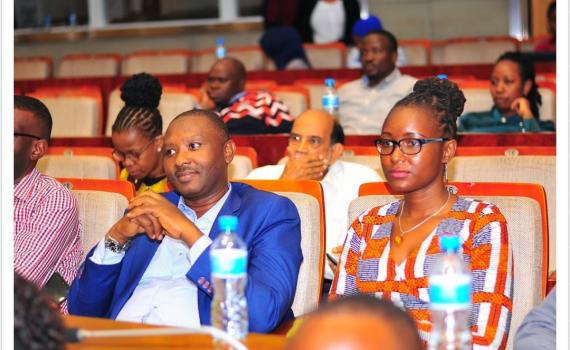
Paul Muneja, Librarian at the University of Dar Es Salaam and EIFL Country and Open Access Coordinator in Tanzania discusses the importance of institutional open access repositories to the research community in Tanzania.
What has changed in open access and open science in Tanzania?
Today, researchers in Tanzania are now relying on open access content in repositories, especially when it comes to comparing what has been already researched to avoid duplication of efforts. Very importantly repository content is being used for similarity checks when students submit their theses and dissertations or assignments. Whenever there is a shortage of e-resources, repositories have been reliable sources for accessing local content and also to see what universities are producing.
Institutional Repositories (IRs) are seen as a good avenue for disseminating scholarly information to the research community, learners, and the general public. They are also seen as an avenue for the preservation of scholarly information: as one of the repository managers said, “The IR stores and keeps track of what is produced and makes it available to others.”
Showcasing institutional intellectual outputs and other important materials - academic papers, theses, dissertations, conference papers, books, journal papers, technical reports, manuals, teacher guides, working papers, academic letters, academic bulletins, research proposals, multimedia files, speeches, textbooks, dictionaries, policies, teaching/learning materials, and lecture notes - is another important function of repositories. In addition, IRs are the means of sharing and exchanging knowledge among scholars.
How - the processes and dynamics leading to change
Open access activities started in Tanzania in 2008. A number of IR sensitization workshops were conducted in 2009 at the University of Dar es Salaam (UDSM); State University of Zanzibar (SUZA); Zanzibar University (ZU); Saint Augustine University of Tanzania (SAUT) – Mwanza; Bugando University College of Health Sciences (BUCHS); Ruaha University College (RUCO); Mkwawa University College of Education (MUCE); Moshi University College of Cooperative and Business Studies (MUCCoBS); Aga Khan University College (AKU), and Mzumbe University (MU).
In 2009, UDSM library conducted a needs assessment survey to establish scholars’ insights about awareness of IRs, and their interest in launching an IR. This step was followed by the IR Guidelines/Policy formulation, and the third step was testing and installing the IR system (using DSpace).
The needs assessment for an IR in 2010 at MU Library revealed that 90% of MU community members accepted the idea, which was very encouraging. The university management also supported the idea and the MU system administrator installed a DSpace repository, which is growing with new research content.
The AKU Institute of Educational Development initiated the establishment of an IR in 2010. The initiative was preceded by a workshop for members of the academic staff to create awareness and solicit suggestions.
Sokoine University of Agriculture (SUA) library led an initiative to create a jointly managed system for the Climate Change Impacts Adaptation and Mitigation (CCIAM) programme that could collect, preserve and disseminate information related to climate change from CCIAM programme members. The library commissioned experts to design a guideline that was discussed by SUA academics and other stakeholders in October 2011, in Morogoro. The guideline was released as a policy guiding operations among five members of the programme, that is SUA, Ardhi University, UDSM, University of Oslo, and the Tanzania Meteorological Agency. The repository became operational in early 2012.
SUZA Library created an IR using Greenstone free and open source software (FOSS) in 2009 within an initiative from the Tanzania Commission for Science and Technology (COSTECH).
The establishment of repositories was a major step; however, repository staff needed knowledge and skills for managing repositories, depositing and preserving content, and maintaining and updating software. Efforts were made by UDSM’s library staff with support from the International Network for Availability Scientific Publications (INASP) to empower the systems librarians to manage the repository software. A good example was the IR sensitization workshops which were conducted in 2009 country-wide, including other training workshops that were being conducted at different times. UDSM Library organized the FOSS regional training in 2011 with support from EIFL that laid the ground for IT personnel and librarians to continue learning the usefulness of free and open-source software for library service
EIFL’s role in driving change
The ongoing open access and FOSS sensitization campaigns supported by UNESCO, EIFL, INASP, SPIDER (the Swedish Programme for ICT in Developing Regions) and other actors have created an enabling environment for IRs in Tanzania.
In 2013, the Consortium of Tanzania Universities and Research Libraries (COTUL) received funding from SPIDER via EIFL to expand open access work in the country.
Through this project, we increased the number of institutional open access repositories, but the growth of content in the repositories was slow. To encourage deposits, EIFL launched a second project in 2016, also funded by SPIDER, to develop institutional open access policies that would mandate deposit of all research output produced, such as journal articles, theses and dissertations, in open access repositories.
These projects built capacity to develop open access repositories and open access journals; they set up open access policy development task forces and supported drafting and adoption of open access policies; they audited and improved open access institutional repositories, and organized open access advocacy meetings and campaigns.
Increased understanding of open access amongst faculty, librarians, research administrators, researchers and students, increases in the number of repositories and the amount of research published in open access are among the project outcomes. The number of items available in 17 institutional open access repositories doubled. Three universities adopted open access policies: Muhimbili University of Health and Allied Sciences, Open University Tanzania and SUZA.
In addition to these, three more universities have adopted open access policies: Ifakara Health Institute, MU and SUA.
Students and researchers were encouraged to practise open access: “Our curriculum on information literacy also includes awareness about open access. We organize workshops which are open to all, and which attract post-graduate students, and we organize seminars on open access for academic staff. As a result, more students and researchers are depositing their papers in our open access repository, which was set up in 2011,” said MUHAS Associate Librarian Professor Tandi Lwoga.
Findings of a digital survey show a high level of awareness of the term open science for 84% of respondents, with the majority associating it with sharing data, publications and research methods, and having encountered it from peers or online sources including social media. About 19% of the respondents learned about open science from the publishing process, 11% during their studies. Only 2% of the respondents had learned about open science from their institutional libraries.
“Respondents recognized that free access to others' works or publications had positively contributed to their research and gave them access to needed information. They also said it helped them share information with a larger audience and improved their visibility and chances of collaboration. It allowed accessibility to hundreds of research materials that would otherwise be difficult to obtain…. They cited that open science, especially OA, led to lower research costs due to free access to information, which is a challenge for researchers and scholars in developing countries.”
The study found that among those who were aware, 72% practised at least one form of open science; out of these 72% - 63,2% practised open access publishing; 34.9% - open source and 31.1% - open data.
What’s next? The future - plans for open science
The paper titled “Knowledge and practices of open science among scholars and researchers in Tanzania” [David et al. (2023)] highlighted the need to create awareness and build knowledge and skills on diverse open science practices, addressing concerns over data security and ownership, copyright infringement, via online resources and peer to peer learning. The study also revealed several areas for advocacy, including setting supportive institutional policies, building infrastructure to support open science practices, providing robust guidelines, institutional support and incentives for individuals to adopt open science practices, and integrating open science into undergraduate and postgraduate curricula so that scientists acquire current knowledge and skills.
The study titled “Communication Channels and their Potential Applicability in Enhancing Agricultural Research Data Sharing among Agricultural Researchers in Tanzania” [Mwinami et al. (2023)] recommends that research institutions invest in generalised and specialised agriculture data repositories to strengthen data sharing among researchers. Institutions should recognise the role of libraries in facilitating data management and sharing.
Strengthening the existing library infrastructures should go hand in hand with recruiting librarians and ICT technicians who would play a greater role in data management and facilitate data sharing among researchers. Institutional research guidelines and regulations should declare the formal channels for sharing research data.
References:
- David, A. B., Alimohamed, M., P., Modern, G., Buhomoli, O. S., Muneja, P. S. (2022, December 19). Knowledge and practices of open science among scholars and researchers in Tanzania. https://doi.org/10.31730/osf.io/vs3j5
- Muneja, P. S., Ndenje-Sichalwe, E. (2016). Institutional Repository Initiatives in Tanzania: Opportunities and Challenges. University of Dar es Salaam Library Journal, Vol. 11 No. 2 (2016). https://www.ajol.info/index.php/udslj/article/view/162198
- Mwinami, N., Dulle , F. W., & Mtega, W. P. (2023). The Communication Channels and their Potential Applicability in Enhancing Agricultural Research Data Sharing among Agricultural Researchers in Tanzania. LIBER Quarterly: The Journal of the Association of European Research Libraries, 33(1). https://doi.org/10.53377/lq.12931
Find out more
Learn more about our support for open access and open science in Tanzania.
SHARE / PRINT







